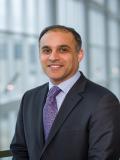Parsia Vagefi

Parsia A. Vagefi, MD, FACS graduated with a B.A. in Biology from Johns Hopkins University, followed by medical school at Yale. During medical school, Dr. Vagefi was a HHMI Research Fellow at MGH under the direction of Drs. David Sachs and Kazuhiko Yamada, where he investigated large animal models of allograft and xenograft tolerance. Dr. Vagefi returned to MGH for his general surgery residency, followed by transplant surgery fellowship at UCSF where he was awarded the American Society of Transplant Surgery Novartis Fellowship in Transplantation for his clinical research with Dr. Sandy Feng, investigating operational tolerance in recipients of simultaneous liver and kidney transplants. In 2011 Dr. Vagefi joined the MGH staff, eventually serving as Associate Surgical Director of Liver Transplantation and Surgical Director of Living Donor Liver Transplantation. Dr. Vagefi also held an appointment as a Senior Investigator at the Center for Transplantation Sciences, establishing an effort focused on the clinical application of liver xenotransplantation- with his group having now achieved the world’s longest survival of a pig liver in a non-human primate. In January 2018 Dr. Vagefi joined the UT Southwestern team as the Division Chief of Surgical Transplantation, and currently holds the Ernest Poulos, MD Distinguished Chair in Surgery.
Financial relationships
-
Attribution:SelfType of financial relationship:There are no financial relationships to disclose.Date added:Date updated:08/19/2025
**Disclaimer**
This Continuing Medical Education (CME) Learning Management System, Ethos, includes individuals designated as 'faculty' for CME purposes. Please note that the term 'faculty' refers solely to their role as a contributor/planner within a CME activity and does not imply any formal affiliation with UT Southwestern Medical Center (UTSW). The display of names and credentials is intended for educational purposes only and does not necessarily indicate a professional or academic relationship with UTSW. Participants are encouraged to verify the affiliations and credentials of faculty members independently if further clarification is needed.

 Facebook
Facebook X
X LinkedIn
LinkedIn Forward
Forward